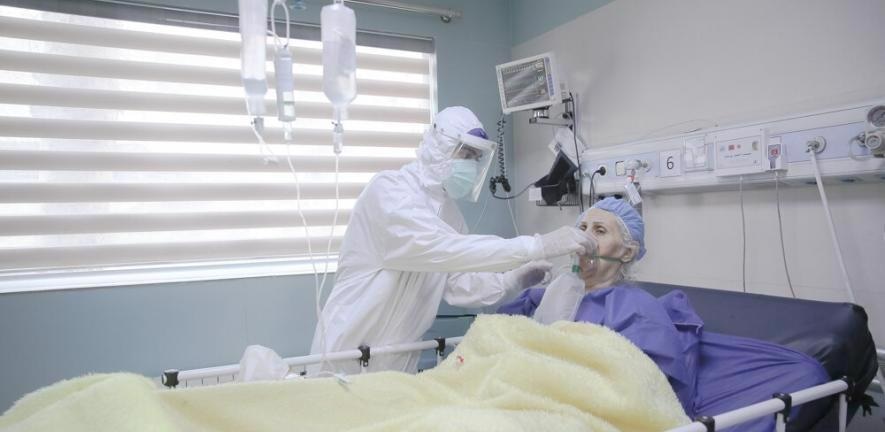Artificial intelligence (AI) has been used to predict the oxygen needs of COVID patients on a worldwide scale by Addenbrooke’s Hospital in Cambridge in association with 20 other hospitals across the globe and healthcare technology pioneer NVIDIA.
 A clinician helping a COVID-19 patient with an oxygen mask in a hospital in Iran. Image Credit: Mehrnews.com.
A clinician helping a COVID-19 patient with an oxygen mask in a hospital in Iran. Image Credit: Mehrnews.com.
The research was triggered by the pandemic and sought to develop an AI tool capable of predicting the amount of additional oxygen required for a COVID-19 patient in the first days of hospital care. The tool was developed using the information collected across four continents.
The method, called federated learning, used an algorithm to study chest X-rays and electronic health data from hospital patients detected with COVID symptoms. The patient data was completely anonymized to maintain patient confidentiality. An algorithm was sent to every hospital to ensure no data was shared or left its location.
Once the algorithm understood the data, the analysis was combined to develop an AI tool capable of predicting the oxygen requirement of hospital COVID patients located anywhere in the world.
The study referred to as EXAM (EMR CXR AI Model) is one of the largest and most diverse clinical federated learning studies ever. The study was published in the journal Nature.
To verify the precision of EXAM, it was tested in several hospitals across five continents, including Addenbrooke’s Hospital. The results revealed that the tool predicted the oxygen required within 24 hours of a patient’s admission to the emergency department. The sensitivity was 95% and specificity was over 88%.
Federated learning has transformative power to bring AI innovation to the clinical workflow. Our continued work with EXAM demonstrates that these kinds of global collaborations are repeatable and more efficient, so that we can meet clinicians’ needs to tackle complex health challenges and future epidemics.
Fiona Gilbert, Study Lead, Professor, and Honorary Consultant Radiologist, University of Manchester
According to Dr. Ittai Dayan, the first author of the study, from Mass General Bingham in the United Stated, where the EXAM algorithm was developed, “Usually in AI development, when you create an algorithm on one hospital’s data, it doesn’t work well at any other hospital. By developing the EXAM model using federated learning and objective, multimodal data from different continents, we were able to build a generalizable model that can help frontline physicians worldwide.”
Clubbing the collaborators across North and South America, Europe and Asia, the EXXAM study took just a couple of weeks of AI learning to obtain high-quality predictions.
Federated Learning allowed researchers to collaborate and set a new standard for what we can do globally, using the power of AI. This will advance AI not just for healthcare but across all industries looking to build robust models without sacrificing privacy.
Dr. Mona G Flores, Global Head for Medical AI, NVIDIA
The results of around 10,000 COVID patients from across the globe were quantified in the study, including 250 entries of Addenbrooke’s Hospital during the first wave of the pandemic in March/April 2020.
The research was supported by the National Institute for Health Research (NIHR) Cambridge Biomedical Research Centre (BRC).
Further development of the EXAM model is ongoing. Mass General Brigham and the NIHR Cambridge BRC are collaborating with NVIDIA Inception startup Rhino Health, co-founded by Dr. Dayan, to carry out prospective studies using EXAM.
Creating software to match the performance of our best radiologists is complex, but a truly transformative aspiration. The more we can securely integrate data from different sources using federated learning and collaboration, and have the space needed to innovate, the faster academics can make those transformative goals a reality.
Fiona Gilbert, Study Lead, Professor, and Honorary Consultant Radiologist, University of Manchester
Journal Reference:
Dayan, I., et al. (2021) Federated learning for predicting clinical outcomes in patients with COVID-19. Nature Medicine. doi.org/10.1038/s41591-021-01506-3.